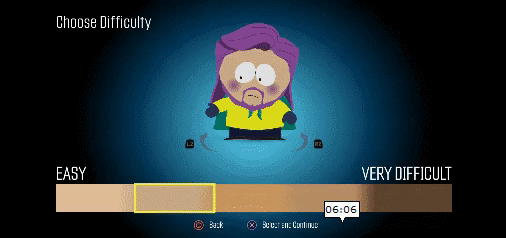
Writers from John Scalzi to author Shannon Sullivan have called being white living life in "easy mode" when compared to the treatment that people of color receive. The upcoming RPG South Park: The Fractured But Whole takes that concept and integrates it right into the gameplay, increasing the difficulty for created characters as their chosen skin tone becomes darker.
Eurogamer was among the first to notice and publicize the feature. At a recent preview event, the site captured footage showing difficulty levels ranging from "easy" for a light-skinned character to "very difficult" for the darkest skin option. "Don't worry, this doesn't affect combat," character Eric Cartman says as you operate the slider. "Just every other aspect of your whole life."
As the developers clarified to Eurogamer, the difficulty setting "affects the amount of money you receive and the way other characters speak to you throughout the course of the game." That raises the concept beyond a throwaway joke on the character creator and into an integral part of the way the game proceeds.
While plenty of games involve some sort of gentle meta-mockery for playing on Easy Mode, Fractured But Whole is the first we're aware of to put such a fine racial point on it. There are plenty of objections to this particular bit of in-game commentary, though. As IO9's Evan Narcisse put it in a tweet, "using black folks' burdened experiences as a wannabe-edgy punchline is just not funny." Others have pointed out how the feature essentially forces black players who want a matching in-game avatar to face a more difficult gaming experience.
Eurogamer also found that The Fractured But Whole also offers the option of playing as either a boy, girl, or "other," and it lets characters identify as cisgender or transgender. This is a big change from the cisgender-male-only character options in 2014's predecessor The Stick of Truth. Choosing a different option in the sequel leads to some humorous meta-discussions of character retconning via a phone discussion between the character's parents and school counselor Mr. Mackey.
South Park has a long history of inserting social commentary on racial and gender issues into the show, a tradition that has frequently led to controversy. South Park: The Stick of Truth continued that tradition, with plenty of "sexual, violent, vulgar, racial, and scatological content" that had to be censored overseas, as Sam Machkovech pointed out in our review.
reader comments
180